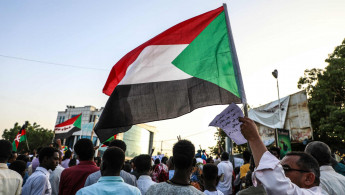Sudanese protest to call on UN to end tribal conflicts
Around 150 Sudanese protesters rallied Thursday in front of the United Nations headquarters in Khartoum to denounce ethnic clashes that have killed more than 200 people this month in Blue Nile state.
Demonstrators held banners reading "No to deaths", "We want to live in peace," demanding an end to the violence that erupted in early October over reported land disputes between members of the Hausa people and rival groups, an AFP journalist said.
Since the start of the year, ethnic conflicts in Sudan have killed 600 people and displaced more than 210,000 others, the UN says.
Access to land is highly sensitive in the impoverished country, where agriculture and livestock account for 43 percent of employment and 30 percent of GDP, according to UN and World Bank statistics.
"Today, we protest to tell the international community to put an end to violence in Blue Nile because the Sudanese authorities are doing nothing," protester Mawaheb Ibrahim told AFP.
The health minister in Blue Nile state, which borders South Sudan and Ethiopia, said Thursday a total of 237 had been killed in the violence last week in the Wad al-Mahi area, about 500 kilometres (300 miles) south of Khartoum.
WATCH: #BNNSudan Reports
— Gurbaksh Singh Chahal (@gchahal) October 24, 2022
At least 200 people have been killed in communal violence sparked by a land dispute in Sudan's Blue Nile region this week, according to witnesses.
Blue Nile Governor Ahmed al-Omda Badi imposed an overnight curfew in the town of Wed al-Mahi on... pic.twitter.com/nINWLE0Te0
"This is not the final toll because there are still bodies in the rubble of homes," he added.
Some "40,000 people, mainly women, children and elderly people, have found refuge in schools in Roseires and Damazin," the two closest major cities, he said.
"International organisations must help us, in particular to provide them with medicines because there are sick people among them," he said.
A high-ranking member of the Hausa, Mohammed Nureddine, told AFP that "entire houses have been burned".
There are "besieged inhabitants, some of whom are injured, but no one can access them" as tensions continue to rage in the area, he said.
Sudan has been grappling with deepening political unrest and a spiralling economic crisis since last year's military coup led by army chief Abdel Fattah al-Burhan.
The military power grab upended a transition to civilian rule launched after the 2019 ouster of strongman Omar al-Bashir, who ruled for three decades.
A surge in ethnic violence in recent months has highlighted the security breakdown in Sudan since the coup.





 Follow the Middle East's top stories in English at The New Arab on Google News
Follow the Middle East's top stories in English at The New Arab on Google News
![The UAE is widely suspected of arming the RSF militia [Getty]](/sites/default/files/styles/image_330x185/public/2024-11/GettyImages-472529908.jpg?h=69f2b9d0&itok=Yauw3YTG)
![Netanyahu furiously denounced the ICC [Getty]](/sites/default/files/styles/image_330x185/public/2024-11/GettyImages-2169352575.jpg?h=199d8c1f&itok=-vRiruf5)
![Both Hamas and the Palestinian Authority welcomed the ICC arrest warrants [Getty]](/sites/default/files/styles/image_330x185/public/2024-11/GettyImages-2178351173.jpg?h=199d8c1f&itok=TV858iVg)